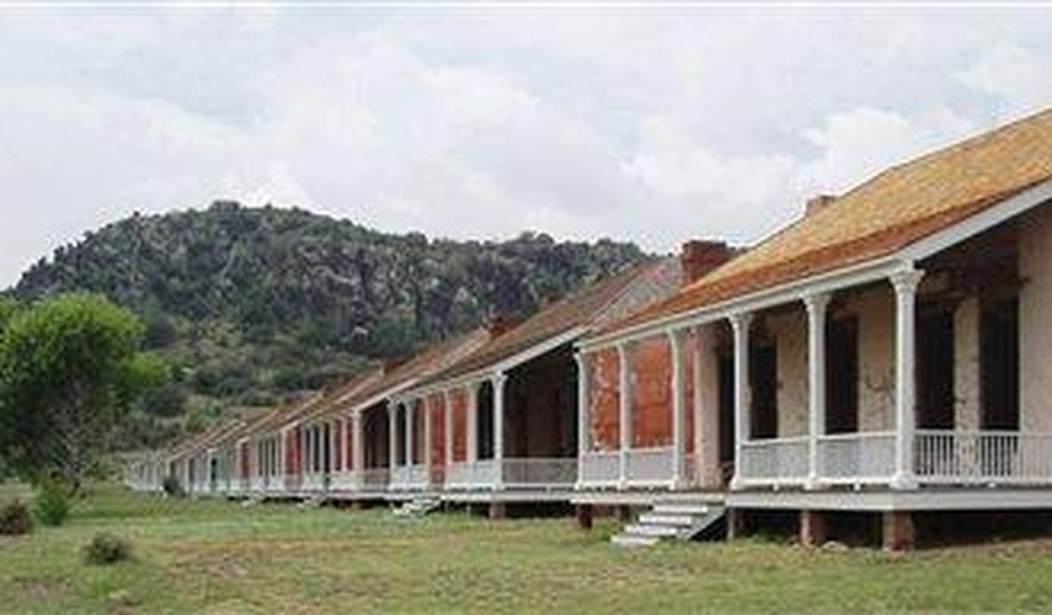What do California gold, a Western frontier fort, and an ex-slave who learned that the abolition of slavery did not abolish racism, have in common?
The original San Francisco 49ers came west seeking the gold discovered in California in 1848. No way there from the East was easy: snowy mountains in the North, disease in the Isthmus of Panama, storms and sea dangers on the long route around South America. Thousands took the San Antonio–El Paso Road, though Apaches were in their way, and then plodded on. In 1854, Fort Davis in West Texas, named after Secretary of War Jefferson Davis, sprang up to protect stagecoaches and wagon trains.
Davis, of course, became more famous as the loser of a war that freed the slaves. Congress in 1866 passed a bill saying the ex-slaves could join the U.S. Regular Army: it created two all-black cavalry units and four infantry regiments. Thus began the service throughout the American West of the Buffalo Soldiers -- and the skin color of enlisted men stationed at Fort Davis from 1867 to 1885 became one more poke at the Confederate ex-president.
The African-American soldiers comported themselves well. During those 14 years they skirmished with Indians more than 100 times. They constructed and kept in repair 1,000 miles of wagon roads and 300 miles of telegraph wire. They scouted, explored, and “wonderfully developed” a vast region, according to one official report. They performed the same duties as white soldiers in other forts. They received the same pay. But all their officers were white.
Meanwhile, Henry Flipper, born a slave in Georgia in 1856, became in 1877, the first African-American to graduate from West Point. He did well in engineering, law, French, and Spanish, but according to “The Colored Cadet at West Point,” published in 1878, Flipper’s white classmates ostracized him -- whenever others were around.
Some came to him privately. Flipper told of one cadet who “expressed -- as all have who have spoken to me -- great regret that I should be so isolated. .on .He assured me that he was wholly unprejudiced [but admitted] that he cursed me and my race among the cadets to keep up appearances with them, and that I must think none the less well of him for so doing. It was a sort of necessity, he said, for he would not only be ‘cut,’ but would be treated a great deal worse than I was if he should fraternize with me.”
Recommended
After graduation, Flipper served at Fort Concho in San Angelo, Texas. Several white officers protested when Flipper’s commander, Capt. Nicholas Nolan, invited Flipper to his quarters for dinner, with his daughter Kate also present. Nolan insisted that Flipper was as much an “officer and a gentleman” as any other officer at the post. Nolan and Flipper both moved to Fort Elliott in the Texas Panhandle, where Flipper became friends with Nolan’s sister-in-law, Mollie Dwyer. They often went riding together -- black lieutenant, white woman -- and the gossip mills churned.
In 1880, Flipper arrived at Fort Davis. Buffalo soldiers finally had an officer of their own race. Not for long, though; in 1881 Col. William Shafter, who apparently did not think African-Americans should be officers, became Flipper’s commanding officer and moved the quartermaster’s safe into Flipper’s quarters. A few months later Flipper found $1,440 or $2,000 (historians vary) missing. He knew the discrepancy could force him out of the Army. He tried to cover up the problem. When challenged, he initially lied about it.
A trial for embezzlement concluded with Flipper found not guilty, but letters he and Mollie Dwyer had exchanged became part of the evidence that he had engaged in “conduct unbecoming an officer and a gentleman.” The Army discharged him in 1882. Routes of the Texas Pacific and Southern Pacific railroads bypassed the fort. It closed in 1891.
Flipper stayed on in Texas, working as a civil engineer and surveyor, and gaining respect that led to him becoming a special assistant to the Secretary of the Interior in the 1920's. Flipper died in 1940, but his story did not die. In 1976, the Army, ruling that Flipper had been dismissed unfairly, changed his record to “honorable discharge.” In 1999, Bill Clinton pardoned him; it was the first time a president had pardoned a person posthumously.

























Join the conversation as a VIP Member